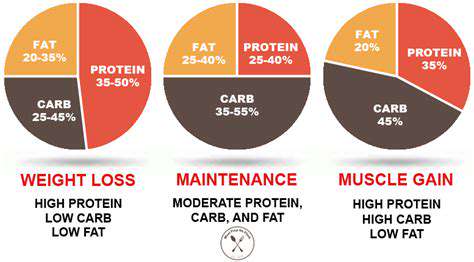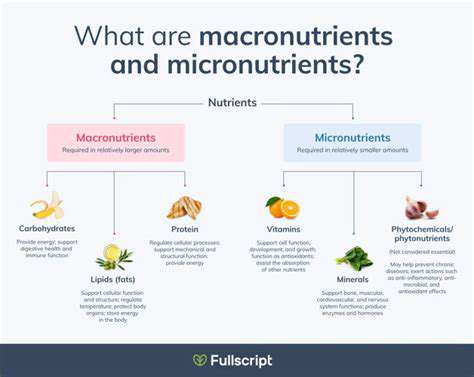Understanding Macronutrients: Fuel Your Body
Jun 26, 2025 / btwgardenmachine/
What are Proteins?
Proteins are organic compounds made up of chains of amino acids, arranged in precise sequences. These molecules are indispensable for life, serving as the foundation for every cell and tissue in our bodies. From mending damaged muscles to powering chemical reactions, proteins are the workhorses of biological systems. Their significance extends beyond mere structure—they regulate processes, defend against pathogens, and enable growth. Without adequate protein, our bodies simply couldn't function properly.
Consider how proteins act as molecular machines: some speed up chemical transformations as enzymes, others communicate messages as hormones, and many protect us as antibodies. This functional diversity explains why nutritionists emphasize protein's central role in maintaining health. A diet lacking sufficient protein can lead to weakened immunity, poor wound healing, and stunted development in children.
Essential Amino Acids
While our bodies can manufacture some amino acids, nine must come from our meals—these are the essential amino acids. Think of them as puzzle pieces; missing just one prevents completion of the protein-building picture. Animal products typically contain all nine, but plant-based eaters must combine different sources like beans with rice to get the full spectrum. The body's ability to repair tissue, grow muscle, and maintain organs depends entirely on this steady supply of building blocks.
Shortages in these critical amino acids manifest in tangible ways—slower recovery from illness, hair loss, or muscle wasting. That's why nutrition experts stress variety, especially for vegetarians and vegans, to prevent deficiencies that could compromise health over time.
Protein Sources
The protein landscape divides roughly into animal and plant kingdoms. Animal proteins—beef, chicken, fish, eggs, and dairy—deliver complete amino acid profiles in single packages. Plant options like lentils, almonds, and soy products often lack one or more essentials, requiring strategic pairing. For instance, combining grains with legumes creates a complete protein profile rivaling meat's nutritional value.
Individual needs dictate ideal sources: athletes might prioritize lean meats for muscle synthesis, while environmentally-conscious consumers may favor plant proteins with lower carbon footprints. The key lies in understanding your goals and crafting a diverse, balanced approach to protein consumption.
Protein's Role in Metabolism
Metabolism relies heavily on protein's versatility. Enzymatic proteins act as biological catalysts, accelerating reactions that would otherwise proceed too slowly to sustain life. Meanwhile, protein-based hormones like insulin regulate blood sugar, demonstrating proteins' signaling capabilities. Even oxygen transport depends on hemoglobin, a complex protein structure in red blood cells.
Beyond these roles, proteins maintain acid-base balance and facilitate nutrient movement across cell membranes. This metabolic multitasking explains why protein deficiency can disrupt everything from energy levels to brain function.
Protein Digestion and Absorption
Digestion transforms dietary protein into usable components through a precise breakdown process. Stomach acid unfolds protein structures, while pancreatic enzymes snip the chains into individual amino acids. The small intestine then absorbs these building blocks, distributing them via bloodstream to tissues in need. Any disruption in this sequence—whether from enzyme deficiencies or gut disorders—can impair protein utilization, underscoring the importance of digestive health.
Protein Needs Vary
Protein requirements fluctuate dramatically across populations. Endurance athletes may need 1.2-1.4 grams per kilogram of body weight to repair exercise-induced damage, while strength trainers might require up to 2 grams for muscle growth. Contrast this with sedentary adults, who typically thrive on 0.8 grams per kilogram. Age also factors in—children and adolescents need extra for development, as do pregnant women supporting fetal growth.
These variations highlight why personalized nutrition advice proves more effective than blanket recommendations. A registered dietitian can assess lifestyle, health status, and goals to determine optimal intake.
Protein and Health
The health implications of protein extend far beyond muscle maintenance. Adequate protein preserves bone density, supports neurotransmitter production for mental health, and even influences longevity. Its high thermic effect—requiring more energy to digest than fats or carbs—makes protein valuable for weight management. Emerging research suggests proper protein intake may reduce age-related muscle loss, helping maintain independence in later years.
Balance remains crucial though—excessive protein, particularly from processed meats, may strain kidneys over time. The sweet spot lies in consuming enough high-quality protein from diverse sources while meeting other nutritional needs.
Fats: Essential for Hormone Production and Cellular Function

Fats and Hormone Production: An Overview
Dietary fats serve as raw materials for hormone synthesis, particularly steroid hormones like estrogen and testosterone. These lipid-derived messengers regulate everything from reproduction to stress responses, making fat intake directly relevant to hormonal balance. The body cleverly converts cholesterol and fatty acids into potent signaling molecules that coordinate complex physiological processes.
This biochemical reality contradicts outdated fat-free diet trends. Modern nutritional science recognizes that severely restricting fat intake can disrupt menstrual cycles, reduce libido, and impair adrenal function—all consequences of inadequate hormone production.
Types of Fats and Their Impact
Not all fats influence hormones equally. Saturated fats from animal products provide cholesterol for steroid hormones but may promote inflammation in excess. Unsaturated fats—especially monounsaturated types in olive oil and avocados—support cell membrane fluidity essential for hormone reception. The omega-3s in fatty fish and flaxseeds give rise to anti-inflammatory compounds that modulate hormonal activity.
Trans fats represent the true villains, artificially altering cellular structures and interfering with hormone function. Their near-elimination from modern food supplies marks a public health victory.
Omega-3 Fatty Acids: A Closer Look
Omega-3s demonstrate unique hormonal influences through specialized metabolites called resolvins and protectins. These compounds actively resolve inflammation, creating a favorable environment for balanced hormone activity. Populations consuming traditional diets rich in wild seafood show lower incidences of mood disorders—a connection researchers attribute partly to omega-3s' modulation of brain hormones.
Modern diets often skew heavily toward omega-6 fats from vegetable oils, disrupting the ideal 4:1 omega-6 to omega-3 ratio. Correcting this imbalance through increased fatty fish consumption or algae supplements can positively impact hormonal health.
Dietary Fats and Hormone Imbalances
Hormonal disruptions frequently trace back to fat quality rather than quantity. Women with PCOS often improve symptoms by replacing refined carbohydrates with healthy fats that stabilize insulin and androgens. Similarly, men experiencing low testosterone may benefit from increased intake of zinc-rich foods like oysters that support testosterone production from dietary fats.
The endocrine system's sensitivity to dietary fats explains why Mediterranean-style diets—abundant in olive oil, nuts, and fish—correlate with better hormonal profiles than standard Western diets high in processed fats.
Cholesterol and Its Role
Despite its bad reputation, cholesterol serves as the backbone for all steroid hormones. The adrenal glands transform cholesterol into cortisol—our primary stress hormone—while gonads convert it into sex hormones. This explains why extremely low-fat diets sometimes lead to fatigue and reproductive issues; without sufficient cholesterol, the body struggles to manufacture these critical compounds.
Recent research differentiates between dietary cholesterol (from food) and blood cholesterol levels, with genetics playing a larger role in blood cholesterol than previously thought. For most people, moderate intake of cholesterol-rich foods like eggs poses little risk while supporting hormone production.
Fats and Hormonal Health in Women
Women's hormonal fluctuations make them particularly sensitive to fat intake variations. During menopause, phytoestrogens from flaxseeds and soy may help modulate estrogen decline when combined with healthy fats that support hormone synthesis. Conversely, excessive saturated fats might exacerbate PMS symptoms by promoting inflammatory prostaglandins.
Pregnancy demands special attention to fat quality, as omega-3s like DHA directly support fetal brain development while helping regulate the mother's shifting hormone levels. Postpartum, adequate fat intake becomes crucial for breastfeeding and recovery.

